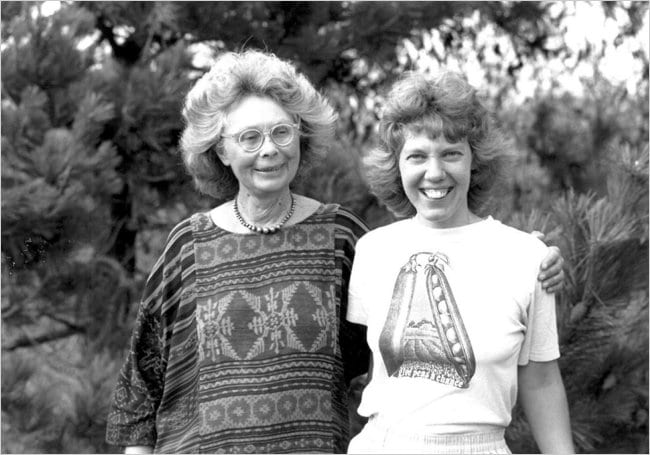Clara Claiborne Park was an enormously significant figure in the early wave of parent advocacy and activism on behalf of children with autism and other developmental disabilities. Park wrote one of the earliest, most graceful, and still most illuminating parent memoirs about autism. The Siege: The First Eight Years of an Autistic Child, published in 1967, told the story of Park’s daughter Jessy, who was called “Elly” in the book. It narrated the Park family’s struggle to make contact with Jessy by laying siege to the isolated world they believed held her hostage.
Born in Tarrytown, New York, Clara Park was educated at Radcliffe, where she received her BA in 1944, and the University of Michigan, where she obtained an MA in English in 1949. She married physicist David Park in 1945 and the couple settled in Western Massachusetts, where David taught at Williams College. While their first three children were young, Park was a stay-at-home mother. When she discovered that she was pregnant with her fourth child, Jessy, Park was looking forward to returning to work as a teacher, and she took a job at Berkshire Community College before Jessy was diagnosed at age three. “The job held me together,” she explained at a time when educated women were expected to devote themselves to the profession of motherhood.
Park’s book directed compassionate, desperately needed, and very practical messages to other parents. Set firm limits. Take good care of yourselves. The advice grew out of Park’s own experience. Children like Jessy required parents and relatives who could provide long-term support. “If they go under, the child goes too,” Park bluntly concluded. She appreciated that each parent’s needs were unique. Park herself was sustained by her work as a teacher. After 1975, she taught in the English Department at Williams College.
At a time when it was not unusual for professionals to regard parents with suspicion and even suggest that autistic children be placed away from their families, Park spoke and wrote about her family’s story with only an occasional hint of anger. She used common sense as an antidote to the poison of parent blame, bringing comfort to others in her situation. She credited her three other children for the fact that she felt no guilt herself. Because they were all smart and adaptable, she was confident she had done a good job as their mother. How could Jessy’s autism possibly be her fault?
Park championed the many advantages that parents had over professionals. Parents knew their children longer and better than anyone, were constantly present in their children’s lives, understood their children’s language (when language was present), and would work tirelessly, and for free, to help their children grow. Park encouraged parents to learn from others like themselves and read extensively in the research and professional literature. In the face of assumptions that overly intellectual parents were responsible for autism, Park boldly asserted that “intelligence and love are not natural enemies…. Love is a technique as well as an emotion.”
 In 2001, when Jessy was in her forties, Clark Park published a second memoir, Exiting Nirvana: A Daughter’s Life with Autism. At the time, Jessy still lived at home with her parents, but she had exited “Nirvana,” Park’s term for the state of ecstatic solitude that had threatened to permanently insulate Jessy from all human contact during her childhood. Jessy’s ability to speak and understand language had grown dramatically. She worked in the Williams College mailroom, managed her own money, and had developed into a gifted artist, specializing in intricate architectural paintings featuring vivid colors and precise geometric stylization. (Park’s art is featured on this website.)
In 2001, when Jessy was in her forties, Clark Park published a second memoir, Exiting Nirvana: A Daughter’s Life with Autism. At the time, Jessy still lived at home with her parents, but she had exited “Nirvana,” Park’s term for the state of ecstatic solitude that had threatened to permanently insulate Jessy from all human contact during her childhood. Jessy’s ability to speak and understand language had grown dramatically. She worked in the Williams College mailroom, managed her own money, and had developed into a gifted artist, specializing in intricate architectural paintings featuring vivid colors and precise geometric stylization. (Park’s art is featured on this website.)
Jessy had outgrown the fixations of her early years. Her most elaborate adolescent “supersystem” used precise mathematical combinations of clouds and doors to categorize days of varying quality. Jessy had used this system compulsively as a teenager. By middle age, her mother described Jessy’s autism as softer at the edges, but still ever-present. She was prone to “enthusiasms” about maps, weather, astronomy, houses, even banking fees. Jessy could still explode in anger, but her frustrations were rooted in the daily activities that annoy us all: getting to work on time, giving her mother daily vitamin pills, and balancing her checkbook. That Jessy was engaged with such ordinary routines was, for her mother, a measure of astonishing growth. Her daughter was no longer under siege.
At a time when autism was deeply stigmatized and autism stories were rarely shared, Clara Park was strikingly open and honest about her family’s experience. Her portrayal of Jessy was at least as detailed as the best medical case studies. It was also lyrically beautiful, the writing saturated by great love and deep insight. Park’s work informed many other parents, as she hoped it would, and her life inspired them. Her accomplishments proved that Clara Park was as brilliant, humane, and exceptional as her daughter.


